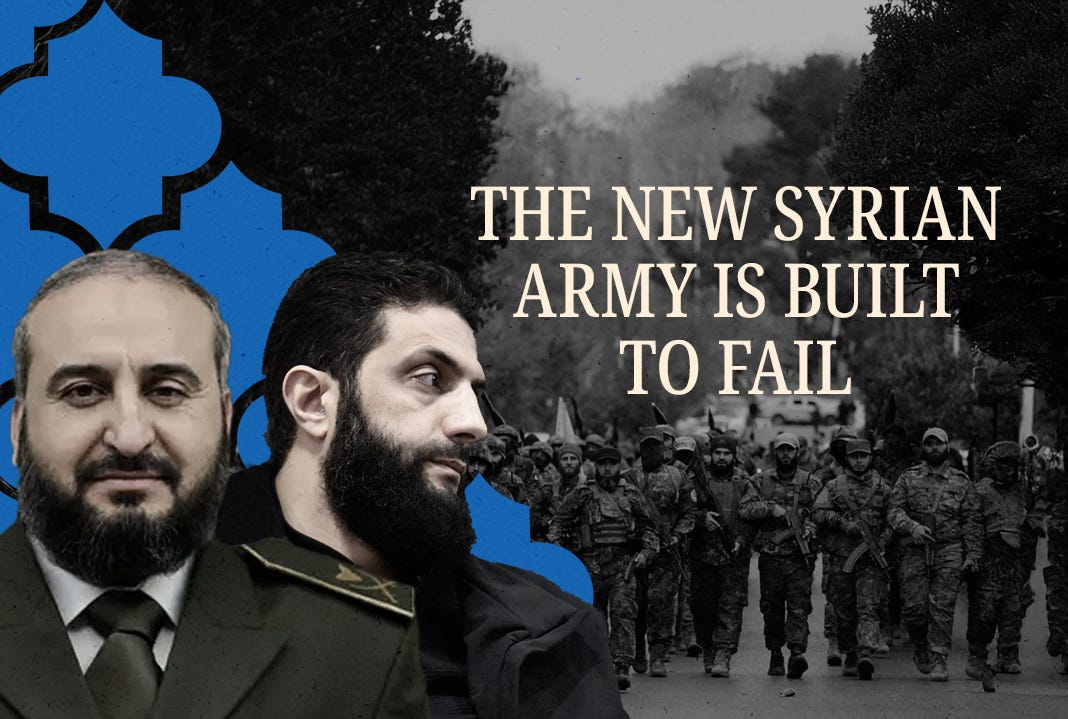The New Syrian Army Is Built to Fail
A pluralistic society demands a pluralistic military—not one ruled by the ideology of those at the top.
Armies are instruments of force, often necessary in the pursuit of national security but inherently destructive if not carefully restrained. When military institutions operate without firm constitutional oversight or professional standards, they produce chaos rather than restoring order. That is the danger now unfolding in Syria.
The newly formed Syrian army, assembled in the wake of Bashar al-Assad’s ouster in the country’s northwest, is already showing signs of becoming less a national institution than a vehicle for sectarian dominance. In its current form, this army is structurally incapable of being professional, impartial, or apolitical.
Modern, legitimate armed forces are governed by codified rules, bound to constitutional authority, and insulated from ideology. Their neutrality is essential to earning public trust and maintaining national cohesion. Yet Syria’s new army appears to operate with none of these safeguards. Instead, its conduct is shaped by narrow Islamist ideology, mirroring the worldview of dominant factions like Hay’at Tahrir al-Sham (HTS), rather than representing the pluralistic society it is meant to serve.
In the aftermath of HTS's takeover, many of the state’s formal institutions were dismantled, including the remnants of the old Syrian Arab Army. That may have been a strategic misstep. While the Assad regime’s military apparatus was guilty of widespread abuses, the institution itself included an established hierarchy and regulatory framework that, with reform, could have offered a more stable foundation for national defense than the current sloppy patchwork of militias and ideologically aligned battalions.
Instead, the new defense ministry has cobbled together forces without a coherent chain of command, a unified code of conduct, or even a shared conception of citizenship. This has led to gross inconsistencies in how the army interacts with civilians. One checkpoint may wave a traveler through with courtesy; another may harass or detain that same person over something as minor as their clothing. These discrepancies erode social capital (the extent to which citizens trust their official institutions) and invite volatility. In a country as beleaguered as Syria, unpredictability in the application of power is a recipe for renewed violence.
The government’s recent announcement of a weapons monopoly—demanding that all armed groups surrender their arms to the state—was in principle a necessary step toward disarmament and demilitarization. But in practice, its implementation has been highly selective. Armed Islamist factions loyal to the current regime have retained their arsenals and continue to patrol towns and neighborhoods with impunity. Meanwhile, opposition-aligned communities and minority groups, particularly the Druze, have been systematically pressured to disarm and publicly scapegoated.
This imbalance extends beyond military dynamics. Official state media has stoked sectarian tensions, especially against the Druze population. In cities like Aleppo and Damascus, Druze civilians have faced harassment and attacks, the most recent of which resulted in a violent episode involving Sunni university students. Though school officials intervened, the message from the top is that loyalty, not citizenship, determines who enjoys protection.
In such an environment, the military’s intervention in civilian areas doesn’t signal stability. It signals sectarian retribution. Communities that fall outside the ideological consensus—whether Alawite, Druze, Christian, or secular—have reason to fear extrajudicial punishments, including vandalism, detention, and even execution. The result is a brittle calm held together by intimidation and coercion.
No state can survive long on the back of such fragile foundations. When an army functions as an enforcer for a single ideology or sect, it ceases to be a national institution and becomes an occupying force in its own country. The lesson of Syria’s past decade demonstrates that repression breeds resistance, and exclusion fuels further disintegration.
Syria’s new rulers must treat the military not as a bludgeon to secure dominance, but as an institution that needs to be professionalized, depoliticized, and made representative of the society it serves. That means inclusive recruitment, standardized training, a unified legal code, and above all, strict civilian oversight.
Time is of the essence. The failure to address ongoing abuses and militia impunity steadily undermines Syria’s security and its prospects for long-term stability. Stability in Syria will only come through legitimacy, and legitimacy requires an army that serves all Syrians, not just those who share the ideology of those at the top.
Middle East Uncovered is powered by Ideas Beyond Borders. The views expressed in Middle East Uncovered are those of the authors and do not necessarily reflect the views of Ideas Beyond Borders.




Excellent point
"Syria’s new rulers must treat the military not as a bludgeon to secure dominance, but as an institution that needs to be professionalized, depoliticized, and made representative of the society it serves. That means inclusive recruitment, standardized training, a unified legal code, and above all, strict civilian oversight."